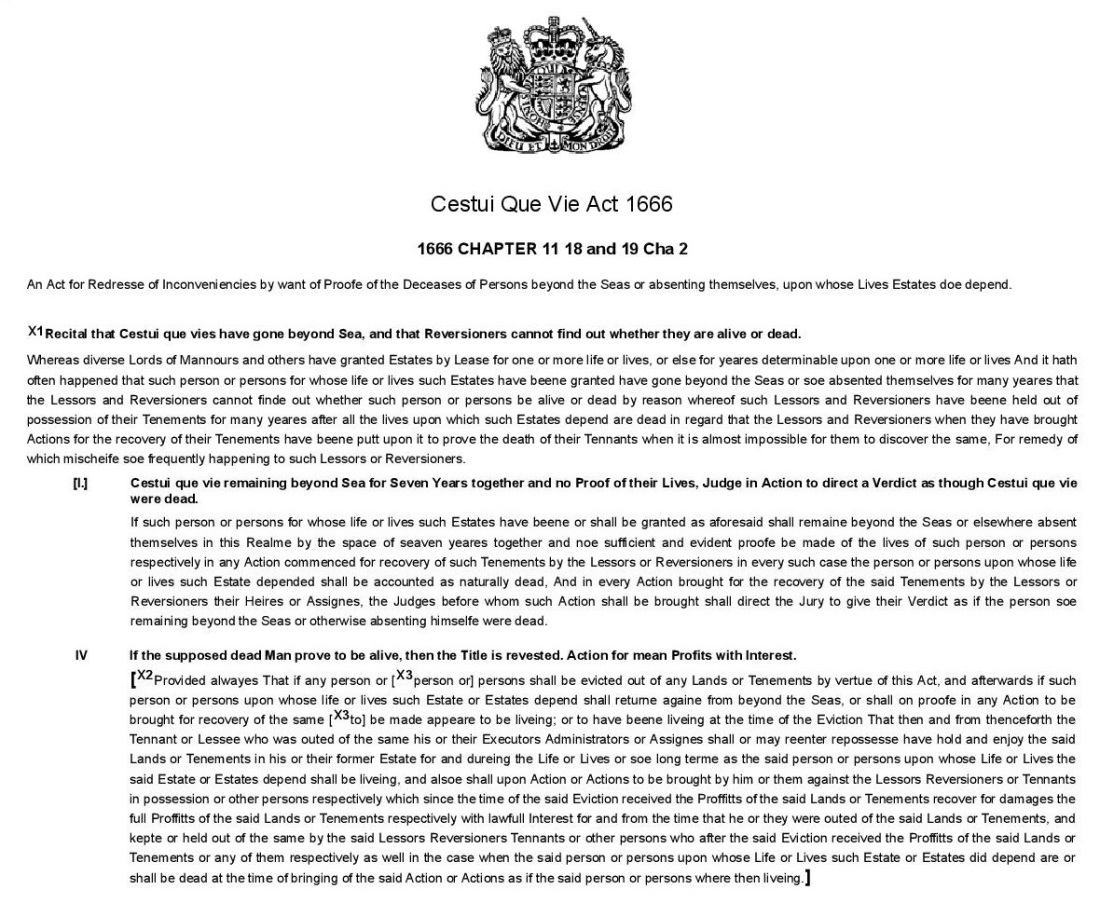The Cestui Que Vie Act 1666

The Cestui Que Vie Act 1666 1 is totally misconceived by those within the OPCA movement. The theory implies that state ownership of their body applies via the birth registration process, and unless this presumption is lawfully refuted before the time period of seven years elapses after registration, they become the property of the state, having been declared legally dead, or “lost at sea”.
This is quite a fantastical proposition, based on a ridiculous abstract speculation regarding the intention of the 1666 Act. It is the foundation for their mythical version of “Maritime Admiralty Law” which they claim is the jurisdictional reason for the enforceability of statute law.
At that particular time in history, many English people were “over the seas” mainly involved in the Anglo-Dutch wars. When they went missing overseas, presumably killed in battle or by piracy, and never returned, it caused a legal dilemma for their families back in England, mainly because of inheritance issues being stalled indefinitely. Often their estates and properties were declared abandoned, and handed to over the church, denying their descendants their rightful inheritance. It was for these reasons the Cestui Que Vie Act 1666 was enacted, which was the first legislation pertaining to the presumption of death.
The Original Act now has a footnote that states…
“There are currently no known outstanding effects for the Cestui Que Vie Act 1666.”
This is because after being amended several times by the Statute Law Revision Act 1886, Statute Law Revision Act 1888, and the Statute Law Revision Act 1948, the Cestui Que Vie Act 1666 was replaced completely by the Presumption of Death Act 2013.
A person may be legally declared dead despite the absence of direct proof of the person’s death, such as the finding of remains (e.g., a corpse or skeleton) attributable to that person. Such a declaration is typically made when a person has been missing for an extended period of time and in the absence of any evidence that the person is still alive – or after a much shorter period but where the circumstances surrounding a person’s disappearance overwhelmingly support the belief that the person has died (e.g., an airplane crash).
Different jurisdictions have different legal standards for obtaining such a declaration and in some jurisdictions a legal presumption of death may arise after a person has been missing under certain circumstances and a certain amount of time. However, if there is circumstantial evidence that would lead a reasonable person to believe that the individual is deceased on the balance of probabilities, jurisdictions may agree to issue death certificates without any such order.
For example, passengers and crew of the RMS Titanic who were not rescued by the RMS Carpathia were declared legally dead soon after Carpathia arrived at New York City. More recently, death certificates for those who perished in the September 11 attacks were issued by the State of New York within days of the tragedy. The same is usually true of soldiers missing after a major battle, especially if the enemy keeps an accurate record of its prisoners of war.
Most countries have a set period of time (seven years in many common law jurisdictions) after which an individual is presumed dead if there is no evidence to the contrary. However, if the missing individual is the owner of a significant estate, the court may delay ordering the issuing of a death certificate if there has been no real effort to locate the missing person. If the death is thought to have taken place in international waters or in a location without a centralized and reliable police force or vital statistics registration system, other laws may apply.
ENGLAND AND WALES…
English law generally assumes a person is dead if, after seven years, if there has been no evidence that they still live, the people most likely to have heard from them have had no contact, and inquiries made of that person have had no success.
This is a rebuttable presumption at common law—if the person subsequently appears, the law no longer considers them dead. The courts may grant leave to applicants to swear that a person is dead (within or after the seven-year period). For example, an executor may make such an application so they can be granted probate for the will. This kind of application would only be made sooner than seven years where death is probable, but not definitive (such as an unrecovered plane crash at sea),
These processes were not considered satisfactory, and so in 2013, the Presumption of Death Act 2013 2 was passed to simplify this process.

Death is taken to occur on:
(a) the last day that they could have been alive (if the court is satisfied that they are dead), or
(b) the day seven years after the date they were last seen (if death is presumed by the elapse of time)(1) This section applies where a person who is missing—
(a) is thought to have died, or
(b) has not been known to be alive for a period of at least 7 years.(2) Any person may apply to the High Court for a declaration that the missing person is presumed to be dead.
SCOTLAND

In Scotland, legal aspects of death in absentia are outlined in the Presumption of Death (Scotland) Act, 1977. 3 If a person lived in Scotland on the date they were last known to be alive, authorities can use this act to declare the person legally dead after the standard period of seven years.
(1) Where a person who is missing is thought to have died or has not been known to be alive for a period of at least seven years, any person having an interest may raise an action of declaration of the death of that person (hereafter in this Act referred to as the “missing person”) in the Court of Session or the sheriff court in accordance with the provisions of this section.
UNITED STATES…

United States Code ss 108 4 calls people who disappear missing or absent. Several criteria affect declaring someone dead by assumption, a person’s being missing from their home or usual residence for, typically, seven years, (the period varies from state to state) such absences being continuous and without explanation, being accompanied by a lack of long-distance communication with those most likely to hear from them, and after diligent but unsuccessful search for that person and inquiry into their whereabouts.
(b) If evidence satisfactory to the Secretary is submitted establishing the continued and unexplained absence of any individual from that individual’s home and family for seven or more years, and establishing that after diligent search no evidence of that individual’s existence after the date of disappearance has been found or received, the death of such individual as of the date of the expiration of such period shall be considered as sufficiently proved.
ITALY…
Unfortunately for their families, it takes 20 years in Italy to declare a missing person dead. After ten years from somebody’s disappearance, a motion to declare the person legally dead can be filed in a court of law. After that, another ten years must pass before the person can eventually be declared legally dead.
I have included the text from the Cestui Que Vie Act 1666 (Chapter 11 18 and 19 Chapter 2) 5 for your interest and research, so the information I’ve given you can be compared to the Act to gain a better understanding of it’s true intention.

.
- 1 http://www.legislation.gov.uk/aep/Cha2/18-19/11
- 2 http://www.legislation.gov.uk/ukpga/2013/13/section/1/enacted
- 3 http://www.legislation.gov.uk/ukpga/1977/27/section/1
- 4 https://www.law.cornell.edu/uscode/text/38/108
Comments
Post a Comment